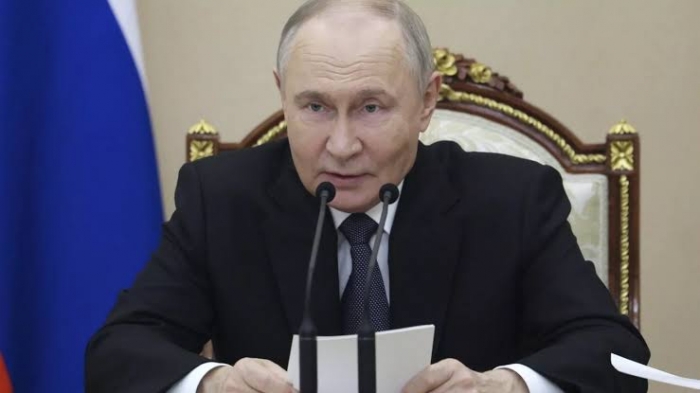WESTERN PERSPECTIVE
Russia says it's waiting for Ukraine's response to May ceasefire and offer of direct talks
The Kremlin said on Tuesday that Ukraine had not responded to many offers by Russia President Vladimir Putin to start direct peace negotiations, and that it was unclear whether it would join a three-day ceasefire he has announced for next month.
"It was President Putin who repeatedly said that Russia is ready, without any preconditions, to start the negotiations process," Kremlin spokesman Dmitry Peskov told reporters. "We have not heard a response from the Kyiv regime so far."
Putin on Monday declared a three-day ceasefire in the war in Ukraine from May 8-10, when Russia plans lavish celebrations to mark the 80th anniversary of victory over Nazi Germany in World War Two.
Ukraine, in response, questioned why Moscow would not agree to its call for a ceasefire lasting at least 30 days and starting immediately.
"We value people's lives and not parades," President Volodymr Zelenskiy said.
Peskov said it was "very difficult to understand" whether Ukraine intended to join the ceasefire.
RUSSIAN PERSPECTIVE
Russia ready to overlook Zelensky’s illegitimacy – Kremlin
The issue of whether Vladimir Zelensky is the legitimate ruler of Ukraine remains a secondary concern for Russia, which is more interested in resuming direct negotiations with Kiev, Kremlin spokesman Dmitry Peskov told reporters on Tuesday.
Since the presidential term of the Ukrainian leader officially expired last May without a vote, Moscow has questioned his legitimacy. Zelensky has extended martial law every three months since the escalation of the conflict in February 2022, preventing the country from going to the polls.
When asked about who Russia would consider holding direct negotiations with, given Zelensky’s status, Peskov admitted that while there are certain legal issues related to his legitimacy, “the interests of entering the peaceful settlement process are above all else.”
“The primary thing is to begin this negotiation process,” the spokesman said, adding that all other questions are “secondary.”
At the same time, Peskov noted the day before that Kiev has not shown any signs that it is actually ready to negotiate, particularly as Zelensky has yet to lift the legal ban on holding direct talks with Moscow for as long as Russian President Vladimir Putin remains in office.
It is also unclear how Ukraine will respond to Putin’s latest 72-hour Victory Day ceasefire announcement, the Kremlin spokesman said on Tuesday, stressing that Moscow has not yet heard a concrete reaction from Kiev to the Russian President’s “gesture of goodwill.”
“It is difficult to understand whether the Kiev regime is going to join this or not,” Peskov said.
Ukrainian officials have not yet outright confirmed that they will abide by Putin’s ceasefire, which is scheduled to last from Midnight on May-7-8 until Midnight on May 10-11.
Zelensky has so far only criticized the proposal, arguing that a ceasefire “mustn’t last only a few days and should instead be immediate, complete and unconditional - for at least 30 days.”
Peskov, however, stressed on Tuesday that it would be difficult for Moscow to agree to a long-term ceasefire without first addressing a number of “nuances” that had previously been highlighted by the Kremlin.
These include guarantees that Ukraine would actually honor the truce, particularly given its history of violating agreements, and Kiev’s ability to rein in a number of “extremist and nationalist units that simply do not obey it.”
Another concern is that the Ukrainian military could use the ceasefire to rearm and recuperate and resume hostilities at a later date, Peskov explained to reporters earlier this month.
Reuters/RT
